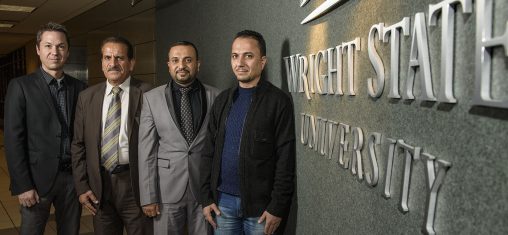
From left: Thomas Fenton, assistant director of Wright State’s LEAP program; Qasim Al-Azzawi, director of the University of Babylon’s English-language center; Amjed Alshalah, an assistant teacher at Babylon; and Asaad Janabi, lecturer of linguistics at Babylon (Photo by Erin Pence)
A partnership between Wright State University and the University of Babylon in Iraq centering on the teaching of English is getting off the ground thanks to funding from an international nonprofit organization.
Babylon, a key kingdom in ancient Mesopotamia, has been a cultural asset to Iraq since the creation of the modern Iraqi government in 1920. The University of Babylon, 60 miles south of Baghdad, has about 10,000 students and consists of 20 colleges within three compounds.
The University of Babylon wants to model teaching at its English-language center after that of Wright State’s Learning English for Academic and Professional Purposes (LEAP) Intensive English Program.
“The long-term goal is to create and sustain a partnership between our institutions where we can promote all kinds of faculty and student exchange research projects,” said Thomas Fenton, assistant director of LEAP.
Several faculty members from Babylon recently spent three weeks at Wright State to learn the core components needed for their English-language center to begin teaching courses similar to those of LEAP.
“I can’t tell you how impressed I am with their knowledge, their capacity to learn and to engage with our program,” Fenton said.
The LEAP program provides full-time and part-time English instruction and helps non-native speakers develop the linguistic, academic and social skills they need to be successful. And Wright State’s Teaching English to Speakers of Other Languages (TESOL) program helps international students learn how to teach English.
“Wright State was not chosen randomly,” said Asaad Janabi, lecturer of linguistics at Babylon.
Amjed Alshalah, an assistant teacher at Babylon, said he is eager to adopt LEAP methods and approaches, which follow the latest curriculum.
“The way of teaching here is so nice,” he said. “The teacher and student interaction is brilliant.”
While at Wright State, the Iraqi educators observed LEAP and TESOL classes and attended a TESOL conference. They met students and faculty, wrote curriculum, toured campus libraries and met with officials at the international office and the Center for Teaching and Learning, which provides technologies, techniques and training to optimize student learning. The educators also worked on a series of webinars they plan to share with their colleagues in Iraq.
The project received a seed grant from the International Research and Exchanges Board and support from the U.S. Higher Education Partnership Program and the U.S. Embassy in Baghdad.
The English-language center at Babylon was established in 2009 and has been developing its programs since then.
“People come from all areas of Iraq to attend the center, to be part of the training courses as well as to have the official certificates of English-language levels,” said Qasim Al-Azzawi, director of the center.
The Iraqi educators said their students want to master English so they can better participate in international conferences and study abroad. Learning English from native speakers is one goal, and the partnership will create opportunities from Wright State students to go to Babylon and vice versa.
“It is great for us,” said Al-Azzawi.

 Wright State to expand nursing facilities to meet workforce needs and prepare more graduates for in-demand careers
Wright State to expand nursing facilities to meet workforce needs and prepare more graduates for in-demand careers  Wright State student-athletes make a lasting impact on local family with more to come
Wright State student-athletes make a lasting impact on local family with more to come  Wright State names Rajneesh Suri dean of Raj Soin College of Business
Wright State names Rajneesh Suri dean of Raj Soin College of Business  ‘Only in New York,’ born at Wright State
‘Only in New York,’ born at Wright State  Wright State president, Horizon League leaders welcome new commissioner
Wright State president, Horizon League leaders welcome new commissioner 